Meet Our Members: Transient Workers Count Too
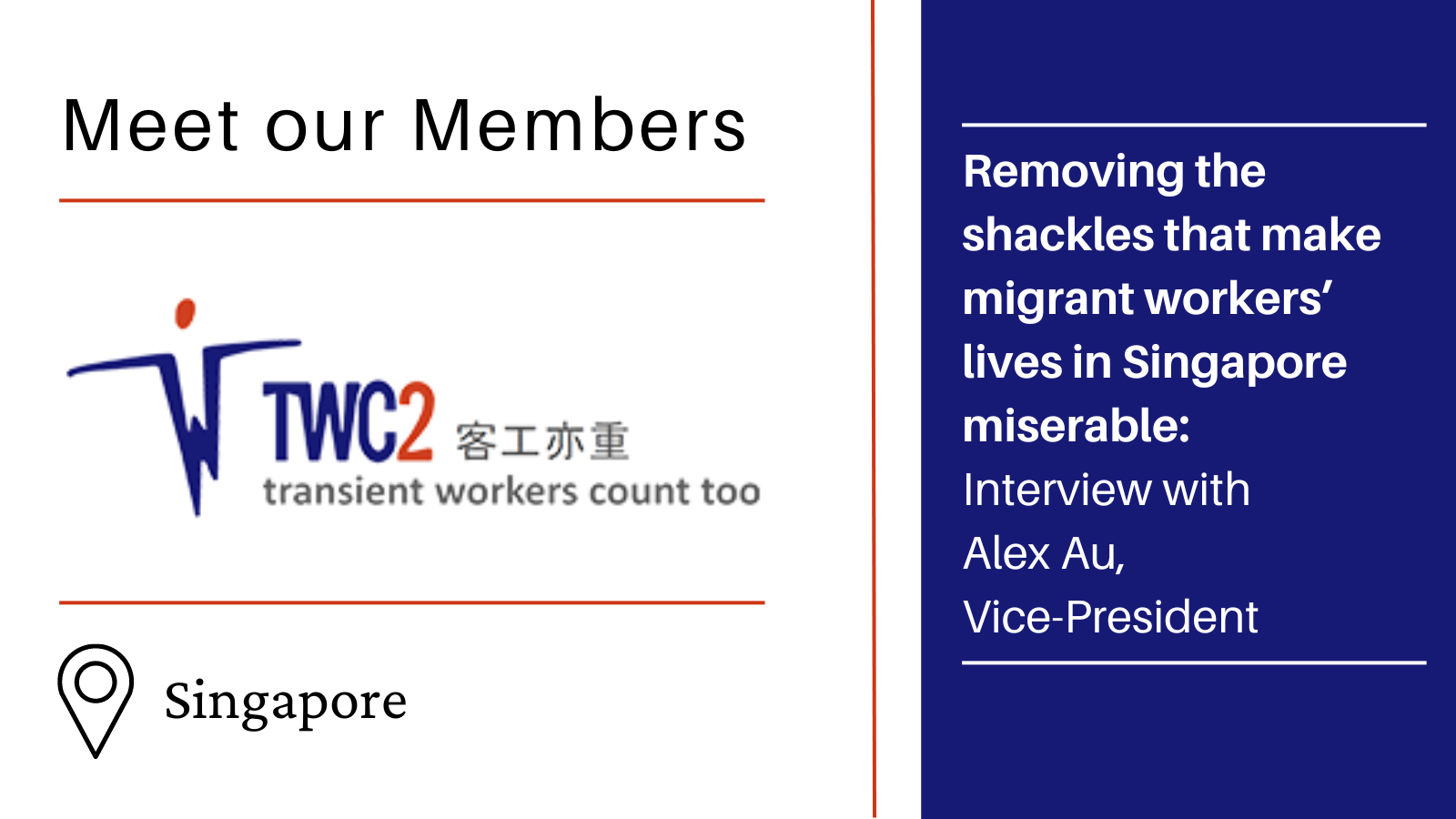
Lee la entrevista en español aquí
Transient Workers Count Too (TWC2) is a GAATW member in Singapore. In July 2022, Sumati Panikkar and Jennifer Janssen from the GAATW secretariat met with Alex Au, the Vice-President of TWC2, in Bangkok to conduct this interview and learn more about the organisation’s work.
Sumati Panikkar and Jennifer Janssen: Can you start by telling us about TWC2’s beginnings?
Alex Au: TWC2 came into existence after a migrant domestic worker from Indonesia had died in Singapore. Some people were aghast by the incident and there was a lot of soul searching. This small group of people then came together to coordinate their individual efforts, to see if something larger can be achieved. We thought that Singaporeans were being callous towards the plight of migrant workers. That was around 2003. We chugged along with little money, office, or staff – just a few people interested in the issue.
Then in 2008, somebody brought to the attention of TWC2 that there were loads of migrant workers, mostly from the subcontinent, who were sleeping rough on the streets in the district called Little India. We were shocked when we went there and spoke to the workers. They did not have housing, because their employers had gone bust and the workers had not been paid several months of salary. We couldn’t arrange housing for them, as it would have cost too much, but they said they’d welcome food since they had no income. We started a free meals programme. It was nothing like the Western idea of a soup kitchen: the workers had to be registered with TWC2 and have a meal card; then they could take that card to one of the participating restaurants and have a meal with dignity – they didn’t have to line up in a street corner to get a bowl of soup.
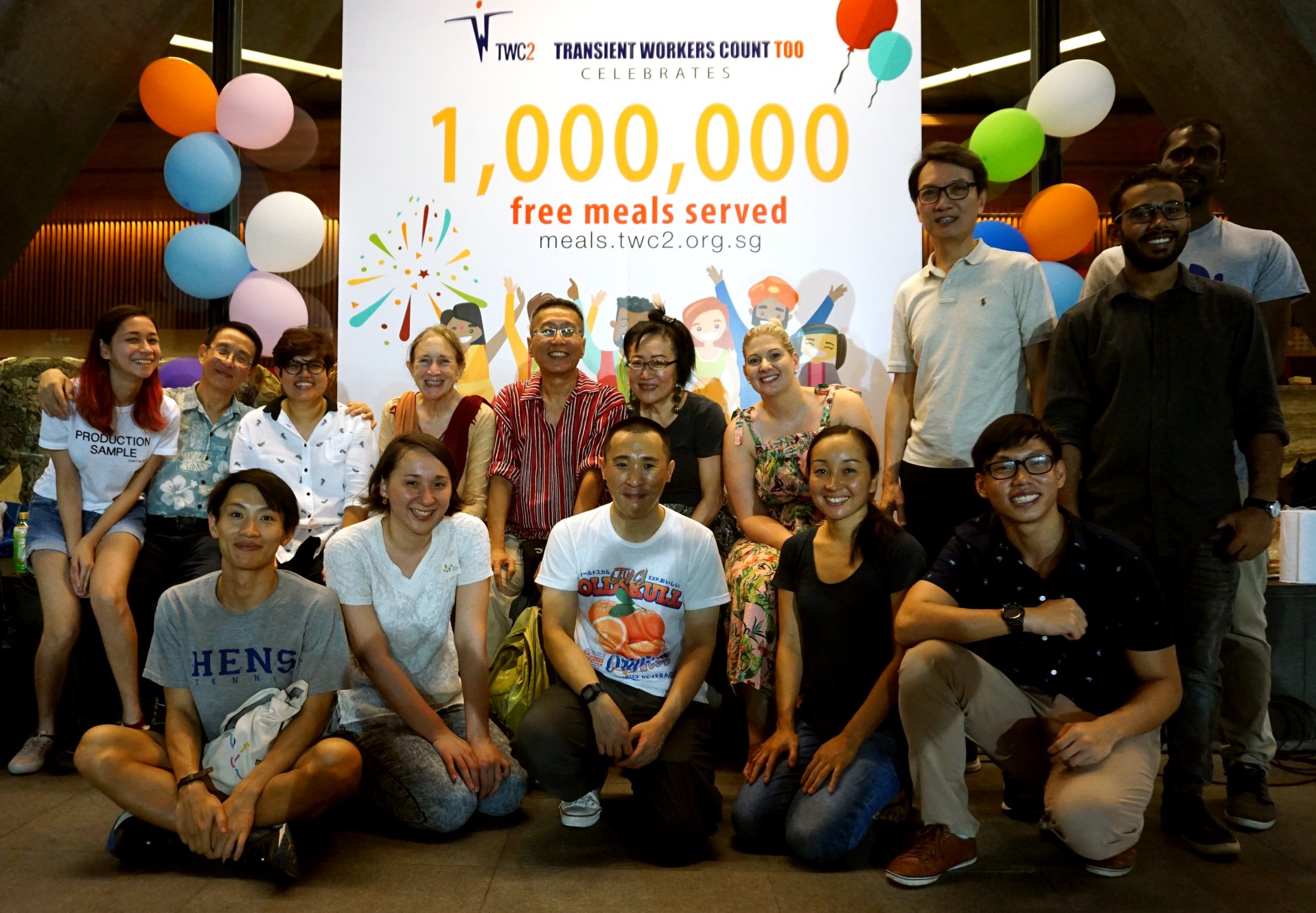 |
In 2018, TWC2's The Cuff Road Project reached its one million meals milestone and threw a street party to celebrate it. The workers had a blast, thanks to contributions from TWC2 volunteers. (Photo credit: Shona Loong, Alex Au, Dollop Photobooth) |
This started in 2008 and it’s still running. The programme has gone up and down. But it’s never been viewed as a solution. Currently, the programme is smaller than before; there are fewer people depending on us for food than at its peak. Why is that? The number of workers laid off is linked to the economic cycle and for now, things are not too bad. More importantly, the government has changed the rules. When workers are laid off but still required to remain in Singapore pending resolution of claims, the employer must continue to house and feed them, even if they are no longer employed with them. So long as you have an ongoing claim against your employer, and therefore have a reason to stay in Singapore, then Singapore will extend your residency until the claim is resolved. For example, if a worker has a salary claim for not being paid for six months, and the claim is filed, they cannot be repatriated. If this former worker is going to stay in Singapore for that claim, the law has made it the employer’s responsibility to house and feed him or her.
TWC2’s client base is predominantly (over 95%) male. The female clients who come to us are more often than not in non-domestic sectors, engaged in cleaning, laundromat services, retail work, and so on.
As an organisation we work only with transient workers – someone who is working in Singapore on a non-permanent basis. They don’t have the right to unionise. And their rights are very different from the workers who are citizens.
The main legislation is the Employment Act, which doesn’t make any distinction between employees who are citizens or non-citizens. The rights are, in theory, the same. The difference is that the citizen employee has an assured right to stay. For a migrant worker, especially a poorer one, a long court case is not a luxury they can afford. They are also vulnerable because their right to stay in Singapore can be taken away at any time. So they’re far more likely to compromise and settle for less than what a Singaporean will, even though the law on paper gives them the same rights.
 |
TWC2’s programme Discover Singapore organises one or two activities and field trips for migrant workers every month. Photo credit: TWC2 |
SP: Did TWC2 start with a larger vision for migrant workers, or to focus on providing immediate help and relief?
AA: From the very beginning, TWC2 has been an advocacy organisation. When you have no money to provide help, then shout as loud as you can. That’s free! It was only when we began running a meal programme in 2008, with a very tangible service, that money started flowing in. Today we have both a service side and an advocacy side. On the service side, we do things like providing medical help, emergency housing, food, and airfare assistance to repatriate workers. Then there is advocacy where we do research, communications, working with academics and journalists, and offer policy ideas. We reach out to the migrant communities using social media, but that will be in their languages and considered part of services, whereas the social media we use to reach out to the Singaporeans is considered part of ‘advocacy’ because it’s about changing mindsets.
SP: What is the aim and vision of TWC2’s advocacy work?
AA: It’s very simple. We would be a success the day we are no longer needed. But that is a utopian thought. In the meantime, our advocacy is focussed on the core fundamentals that make or break a workers’ agency. We believe that all migrant workers have the wherewithal (the intelligence, common sense, social networks) to solve their own problems if only we allow them to. What we can do is to remove the shackles that currently prevent them from solving their own problems. Our service provision is just a stop-gap measure. Our advocacy is to say, ‘give the workers freedom to look after themselves’.
We identify the shackles that make migrant workers’ lives miserable and argue for their removal. Or, if rules are still needed, then what the better regulatory system should be. That is the path that is more respectful of their autonomy than trying to ‘take care’ of them, which the Singapore government boasts they are doing. ‘Taking care’ infantilises workers and is a slippery slope to making decisions for them.
SP: What kind of shackles are you referring to?
AA: For example, the current laws say that in most circumstances a migrant worker may not switch to another employer, except with the permission of the current employer. Even when a contract has ended or when the employment was prematurely terminated by the boss, a migrant worker is not allowed to transfer to a new job without first being repatriated. This makes them vulnerable to the whims and fancies of their employers since repatriation is likely to mean a long period of unemployment and greater difficulty (and cost) in finding a new job here. So, migrants’ bargaining power is completely undercut and you can imagine that the employment relationship is not going to be a healthy one. We see that as one of the two main shackles. Our term for this is ‘job mobility’ – the right to move to another job. We understand that there has to be a time limit for the extension of the stay so they can look for new jobs. We think that a reasonable time limit is 90 days. As soon as a job ends, whether the worker quits or the employer sacks them or the company has gone bankrupt, then the employees should have their visas extended for 90 days in which they are free to look for new jobs.
Another shackle is the recruitment fees for the jobs, a cancer that is extremely common throughout Asia. Workers are expected to ‘buy’ their jobs, and the amounts of money involved are mind-boggling. The money a new domestic worker pays to start working is, on average, 7-8 months of her salary. Those from poorer countries like Myanmar pay even more; those whose governments may look after them a bit, like Philippines, may pay less. Which means the worker does free labour for those 7-8 months of her employment contract which may be as short as two years. In any case, the employer is not bound to keep her for the full duration of the contract. Premature termination without compensation is entirely permissible.
Once a person is in debt, it’s impossible for her to leave the job, she’s trapped. If the employer starts making unreasonable demands at work, you cannot even say no. For them to be able to say no, we must remove that shackle.
Male workers in construction, shipping, and other such industries, from countries like India or Bangladesh coming to Singapore have been known to pay as much as 40 months’ basic salary, in a job that has a duration of 12 months. All they can do is hope to renew the visa for many years to recoup what they paid upfront for their jobs but how would they be able to assert their rights if pleasing the boss is critical to any hope of visa renewal?
JJ: What are some of the main issues TWC2 is focussing on at the moment?
AA: Besides the food programme, medical programme, and transport subsidies I spoke about, there is also support for connectivity – we’ve been giving workers full mobile top-ups so they can stay connected. Workers have to register with us, and pass the eligibility criteria, and then we provide top-up on their number. They just need to have a smart phone, which they all do – in Singapore, no one can function without a smartphone anymore, especially post-pandemic.
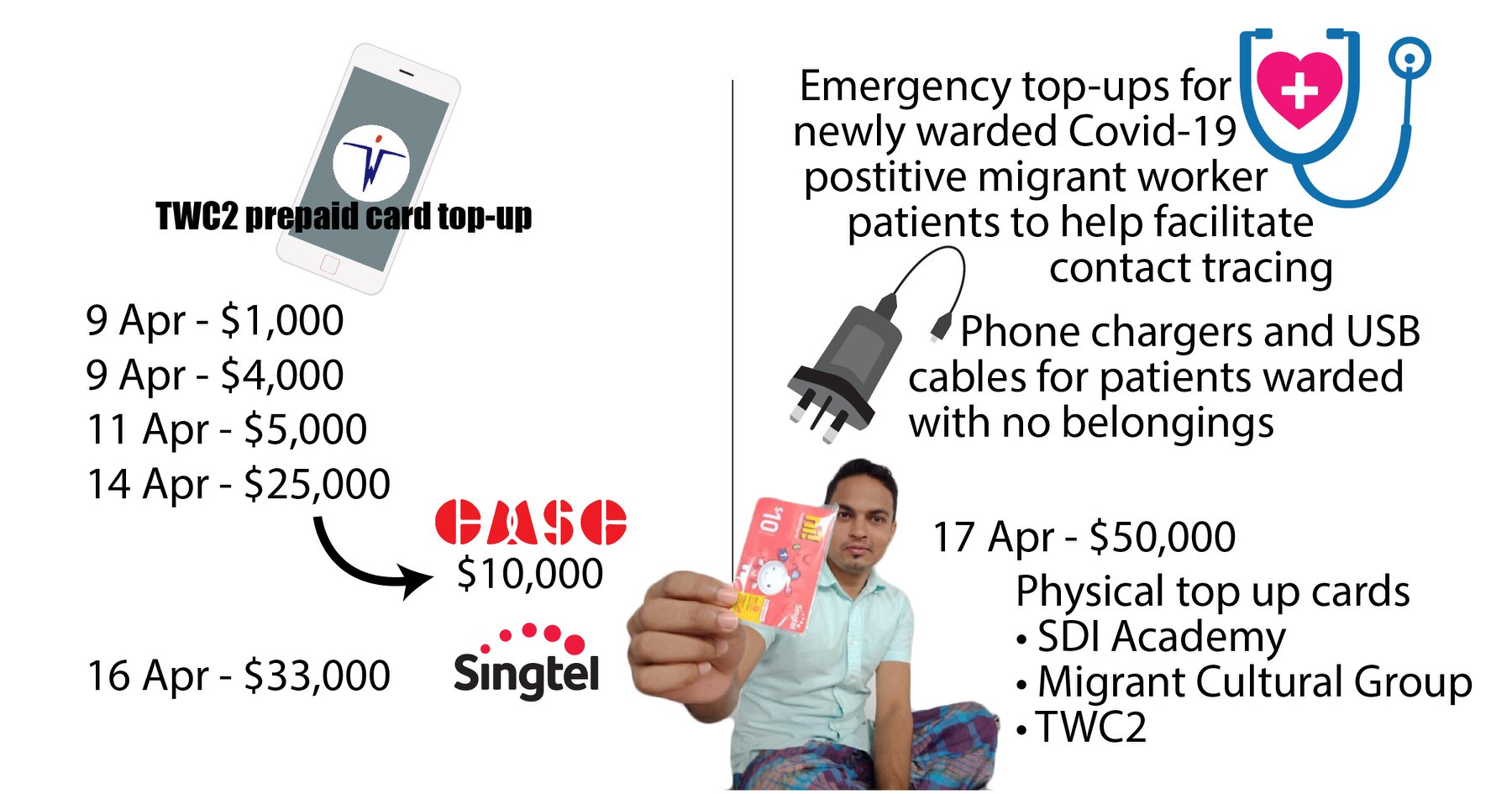 |
Since the COVID-19 pandemic began, TWC2 has distributed hundreds of thousands of dollars’ worth of sim cards, top-ups, and phone chargers to migrant workers so they can contact their families. |
JJ: How has Covid impacted your work?
AA: We’ve become like a call centre. We used to go to the street corners to reach the workers, giving pamphlets and so on. We call it ‘outreach’. But now it’s through Facebook, Instagram… We receive a lot of calls on our helpline and messages on WhatsApp and Facebook.
SP: What kind of calls do you get?
AA: They vary. The top three issues are about salary non-payment, injuries, and need for medical care, and all sorts of difficulties getting into a new job, like misrepresentation, documentation, employers trying to claw back costs of bringing them in, and so on.
Male workers tend to have the luxury of time as their problem gradually develops. They can have a conversation with us over several days or weeks before they decide on a course of action based on the information we give them.
For domestic workers, as they live with their employers, the crisis can present very suddenly. I’ll tell you one incident. A domestic worker from Punjab, India was hired in Singapore by an Indian expat family – directly, not through an agent. She was made to work in the house as well as the family shop. She didn’t know anyone in Singapore. The day she escaped from the house, she said ‘that day I knew that I absolutely had to get out of that house. But I didn’t know where to go. The only thing I could see from the window of that apartment was the dome of a Sikh temple in the distance’. She was isolated from her country, social contacts, family, and community. She was also linguistically isolated. She packed her bags and ran to the Sikh temple. She found someone there and poured her heart out to them. That person contacted us and within half an hour, the woman was in our office with all her belongings. We had to scramble for a place for her to stay that night.
This is one of those instances where she could not have pursued a case against the employer without having to burn all the bridges and run away. Her crisis was sudden and deep. For people working in a non-domestic work job, they live in one place and work in another. They travel to work. For such a worker, it’s possible to reach us on a helpline, on her day off or during commute.
This is the third shackle – live-in domestic work. We argue that it should be stopped. There should be no live-in domestic workers. This worker is on call all day all week. The behaviour of the employer cannot be monitored as it’s within a private residence. In Singapore, almost all apartments don’t have a spare room for the worker; we’ve had cases where domestic workers are made to sleep on the floor in the kitchen, the balconies, storeroom or under the table. The workers’ phones are sometimes taken away and locked up, they have no way of reaching out. We’ve heard from some workers that they’re not allowed access to the bathroom until the families have used it, they can’t eat till the employers have taken their meals and so on. These are abusive conditions. So, we argue that domestic workers should also live in a dormitory and have fixed hours of work. We understand that there may be families who need 24-hour care, like an elderly person or bed-ridden patient. In such cases, workers should be hired on shifts. Why can’t we hire domestic workers in shifts, when we have this for commercial enterprises such as security guards at malls? The moment domestic workers live in a dormitory, a lot would change.
SP: Where do most domestic workers in Singapore come from?
AA: Most come from the Philippines, Indonesia, and Myanmar. The employers are Singaporeans and, of course, high-income expats from other countries.
I want to narrate another incident. One day a security guard working in an apartment complex called us. He said that every day at a certain time, there would be a piece of paper dropped on the grass below. When he picked it up to see, it was in a language he couldn’t understand. He showed it around but for weeks, no one could decipher the words. Finally, he met someone who told him that it was Hindi and that the message said, ‘help me, I am stuck’. So, there was one domestic worker somewhere on a high floor in a fancy high-rise apartment, who was throwing a piece of paper each day asking for help. The only language she knew to write was one which virtually nobody in Singapore understood.
A worker who lives outside would be in a different position. She could learn English or another language of the country more easily. She could make friends and ask someone to translate. Once they acquire the language and a social network, they are free of the linguistic shackle and the isolation it imposes.
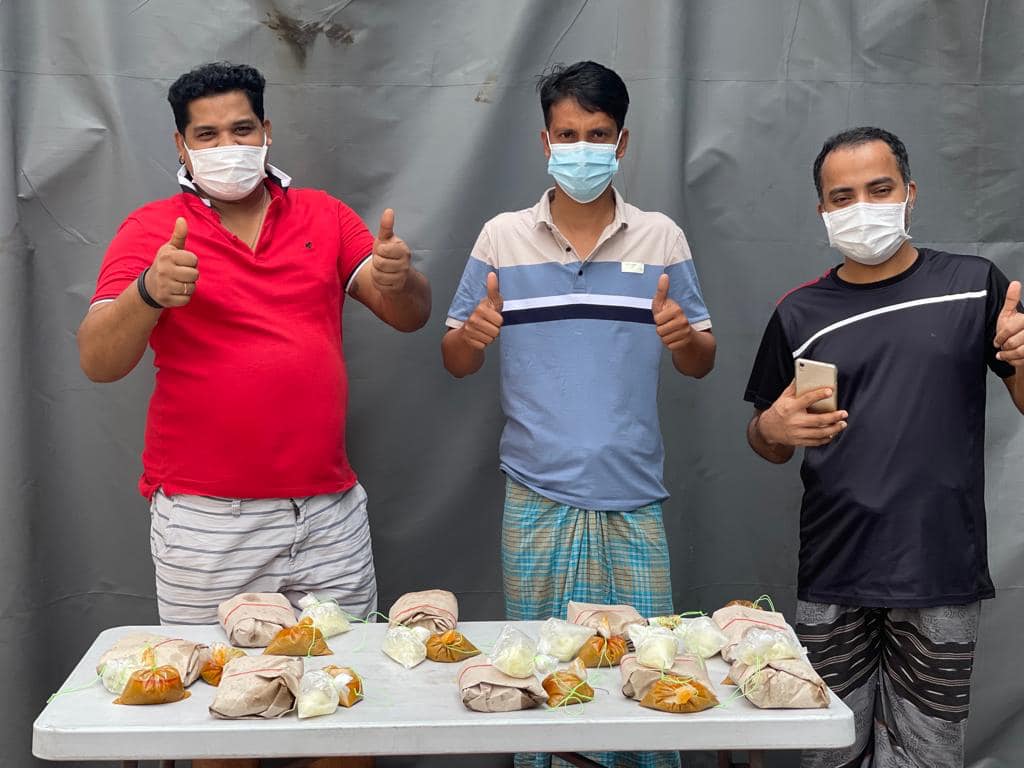 |
For Diwali in 2021, TWC2 gave out over 1,000 packets of food and sweets to nine migrant worker dormitories. Photo credit: TWC2 |
SP: What are the major sectors where migrant workers are employed, apart from domestic work?
AA: Approximately one-third of the working population in Singapore are migrants. They are in all sectors – banking, healthcare, construction, sanitation, education, just to name a few. Low-wage migrant workers are found more in the kinds of jobs that Singaporeans no longer want to do: dirty, dangerous, and demeaning, such as cleaning, municipal sanitation, construction, shipbuilding… And increasingly, for better salaries, also as waiters, nurses, in manufacturing, and so on.
If you’re asking me from which sectors most TWC2 clients come, that would be primarily, construction as the first big group, shipbuilding as the second, and chemical industries as the third. Mostly Bangladeshi and Indian men. Why? They are the most vulnerable. They have paid the most money to get this work. South Asians tend to pay way higher recruitment fees than Southeast Asians and Chinese. Having to pay more drastically changes their situation. One worker from one country may have a debt worth three months of his salary, while another will have a debt worth three years’ salary. He’ll be stuck at his job for that long, even if he is not happy.
SP: Do you incorporate the voices of migrant workers in your work?
AA: This is a controversial discourse. I think the idea that the migrant worker should be at the forefront of campaigns is one of those framed from a western context where the migrant can speak up. There, it is hard to deport a migrant. A worker can organise and speak up. But in places like Singapore, which are very quick to deport, encouraging migrants to speak up is self-defeating. It happened recently when someone was deported for criticising the Covid policy for migrants. It would be immoral to encourage migrants to organise and speak up in such a situation because it would mean them losing their jobs. The fact is, we work in an authoritarian context.
TWC2 remains very much a Singaporean-run organisation because, as citizens, we have the right to stay on and speak up, unlike the migrants. But this is not to say that we don’t believe in the principle of the authentic voice, or being reflective of the needs, sentiments, and the priorities of the migrants themselves. How do we do that? We have affiliate groups organised by migrants. They’re not even allowed to register as organisations since registration requirements are onerous. But if they don’t resister but work like a society, they will be criminalised and considered illegal. They can’t raise money as that would be illegal too. The only way they can operate is if it’s under an umbrella of an organisation run by Singaporeans, like TWC2. We have three such affiliate groups: one for Indonesian domestic workers, one for Filipino domestic workers, and one for South Asian male workers. They are in constant touch with us. They tell us about their needs and priorities. But it would be extremely risky if they spoke publicly. We have to speak for them to navigate these dangers.
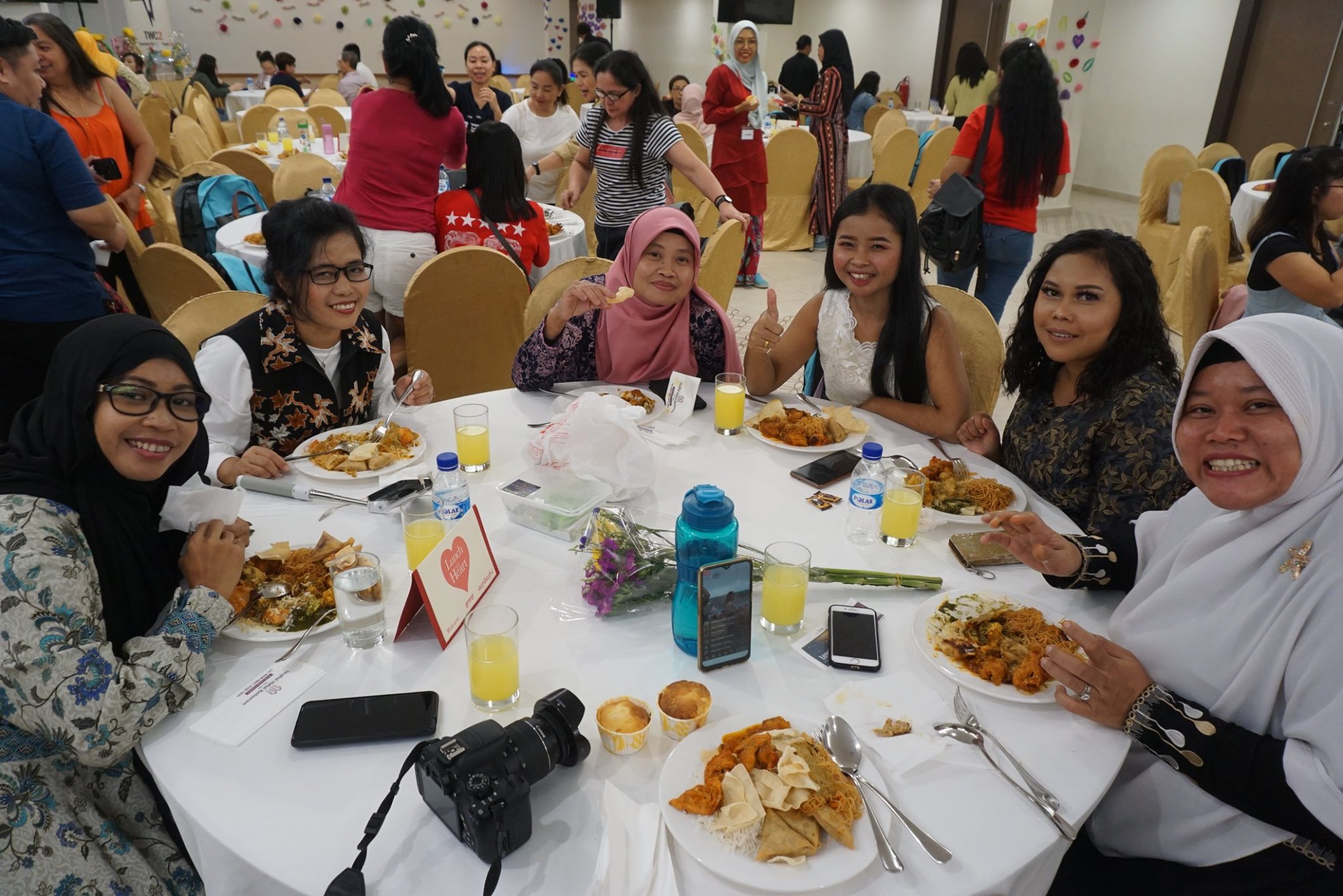 |
On 8 December 2019, TWC2 treated 250 male and female migrant workers to a buffet lunch, performances and lucky draw prizes. For just one afternoon, they could put their troubles behind and just be happy. |
SP: What is the situation with trafficking in Singapore?
AA: There is a spectrum of abuses where one person exercises unreasonable, unjustifiable, and unfair control over another person. This can manifest in minor ways such as demanding unreasonable working hours which the worker can’t refuse; all the way to a situation where one individual claims ownership rights over another or monetises the movement, selling, and buying of another. We think it is not useful to try to slice this up too finely. Ultimately, it’s a continuum. Like all continuums, it escalates. Precisely because it’s a continuum, it’s important to be intolerant of even the minor abuses, because they become seeds that escalate to bigger abuses. So, in the interest of prevention of trafficking and slavery in the classical sense, it’s important to pay attention to the minor abuses. If your floor is very dirty with sand, dust, and clay, how are you going to see the specks of blood underneath the dirt? But if you have a very clean floor, you can see even one drop of blood on the floor. That is what we need to do. If you want to be effective about trafficking, you have to deal with these minor abuses that set people down this road like having to pay for jobs, unregulated working hours, unsafe working conditions, control over the person’s right to mobility and communication, limitations on their freedom to exit from a bad job, etc. If you deal with these, it will be difficult for the situation to escalate.
In Singapore there is legislation called Prevention of Trafficking Act, which is pretty useless. Even though it draws its language from the Palermo Protocol, the actual implementation has been sparing, to put it euphemistically. And very often when we speak to the people in charge, we see them tuned most often to sex-related offences. They dismiss anything that is not sex-related as something that is not trafficking. Labour trafficking cases are ignored. The one occasion the law was used for labour trafficking, as they claimed, was about a woman working in a bar. Of the hundreds of thousands of domestic workers, construction workers, cleaners – many reporting constrained liberties – there has yet to be a single case.
SP: What would you say are some of the successes of TWC2?
AA: On the whole, our trajectory has been one of slow success. I can think of many examples where we have highlighted an issue and some years later we’ve seen changes in the regulations and policies. Twenty years ago, our focus was to try to get domestic workers a weekly day off for rest. Our campaign went on for ten years. Finally, the government changed the law and said that domestic workers are entitled to one rest day a week. So, ten years of work paid off. We stopped campaigning on that, even though the law is not well written. For example, it doesn’t specify how many hours a day off is. Some families require the worker to finish all their chores for the day before she can take the rest of the day off. That is not a full day. Secondly, the law allows the employers to come to a mutual agreement with the worker to buy back a day off. The worker would not say no, because of her dependent situation. The only way she can say no is if we remove the shackles – if she lives out, has not got into a debt to get this job, and if she has the right to quit her job to seek a new one. If these three shackles are removed, one can leave in place the clause about mutual agreement regarding cancelling the rest day. Because then the worker would have the autonomy to agree or not agree. This is an example of why TWC2 doesn’t campaign on the nitty-gritties, but on the big shackles. We need to give her the power to say no and she will know how to protect herself.
Another was the law placing the responsibility on the employer to give food and shelter to the worker in case of a claim. We spoke a lot about workers being homeless and without food after being fired. The government then changed the legislation. For years, we spoke about the need to require all wages to be paid via banks to make it possible to audit whether salaries have been properly paid. Finally, the government instituted such a rule in 2020.
And of course, we’ve been talking about recruitment costs in all these years. Now, I can see a change regarding that too, the government is prepared to think about having a process of recruitment without avaricious agencies being involved. It’s not as simple as abolishing it but there is thought about bringing a change. These are some of the gains over the years based on our work.
JJ and SP: We don’t have any more questions. Thank you very much for speaking to us, Alex.

